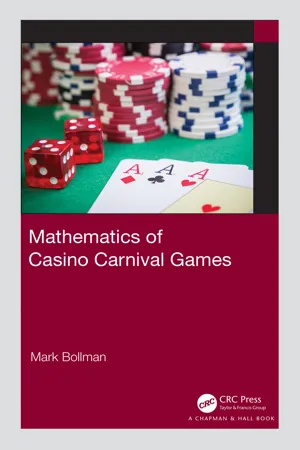
- 308 pages
- English
- ePUB (mobile friendly)
- Available on iOS & Android
Mathematics of Casino Carnival Games
About This Book
There are thousands of books relating to poker, blackjack, roulette and baccarat, including strategy guides, statistical analysis, psychological studies, and much more. However, there are no books on Pell, Rouleno, Street Dice, and many other games that have had a short life in casinos!
While this is understandable — most casino gamblers have not heard of these games, and no one is currently playing them — their absence from published works means that some interesting mathematics and gaming history are at risk of being lost forever. Table games other than baccarat, blackjack, craps, and roulette are called carnival games, as a nod to their origin in actual traveling or seasonal carnivals.
Mathematics of Casino Carnival Games is a focused look at these games and the mathematics at their foundation.
Features
• Exercises, with solutions, are included for readers who wish to practice the ideas presented
• Suitable for a general audience with an interest in the mathematics of gambling and games
• Goes beyond providing practical 'tips' for gamblers, and explores the mathematical principles that underpin gambling games
Frequently asked questions
Information
Table of contents
- Cover
- Half Title
- Title Page
- Copyright Page
- Dedication
- Contents
- Preface
- 1. Mathematical Background
- 2. Mathematics and Casino Game Design
- 3. Wheel and Ball Games
- 4. Card Games
- 5. Dice Games
- Appendix A: Answers to Selected Exercises
- References
- Index